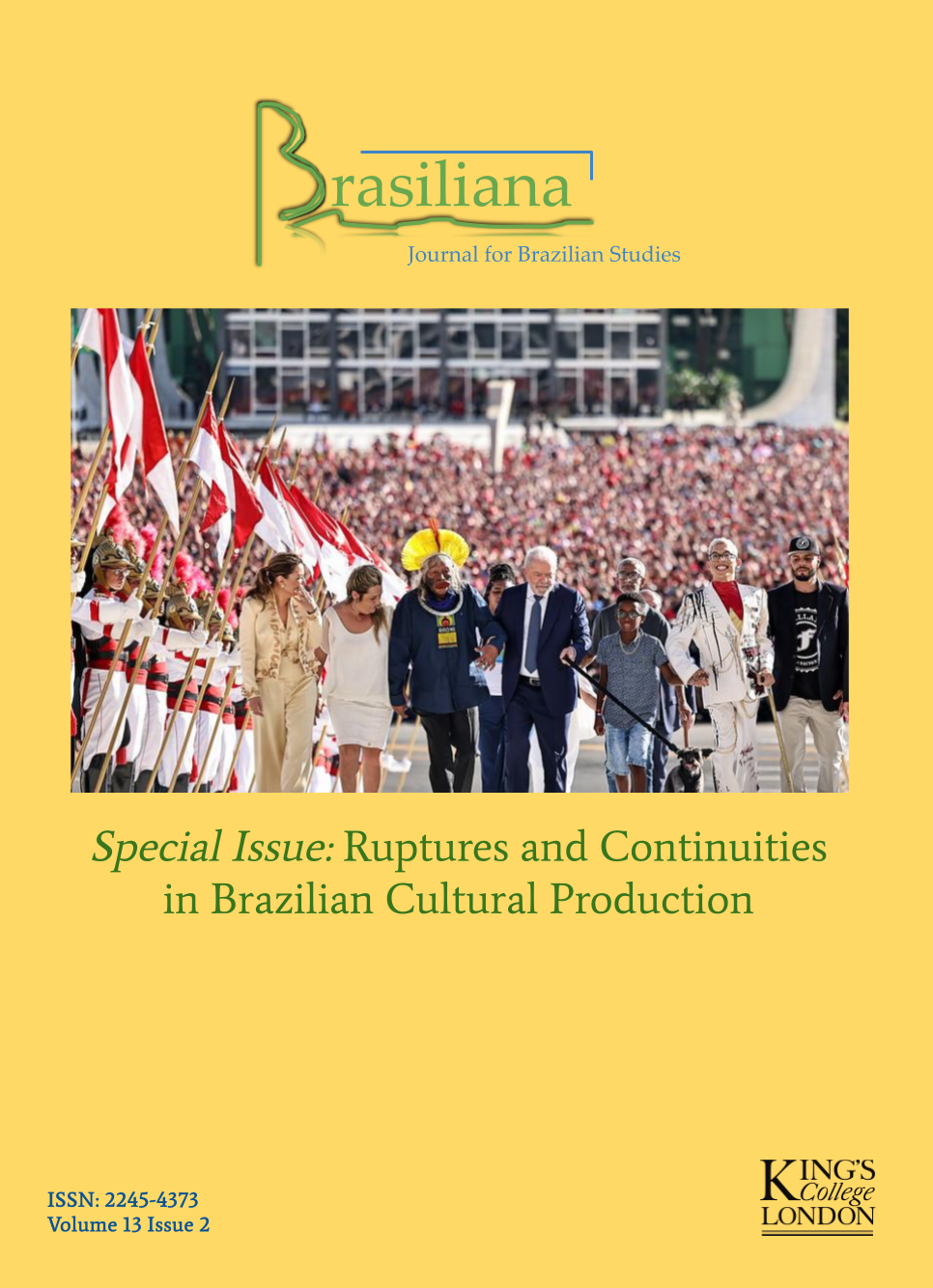Who’s Afraid of Boi Neon? Fertilizing Utopias in the Sertão
Main Article Content
Abstract
Profound anxieties around gender, couplehood and reproduction, as they stand today, can be felt the world over. Simultaneously a swing towards the political right and the so-called culture wars have escalated, curtailing abortion and LGBTQIA+ rights. The work of Brazilian transmedia artist Gabriel Mascaro enters a dialogue with such anxieties and makes a bespoke, utopian proposition: that the abolition of gender stereotypes goes out with neither a bang nor a whimper but rather as a non-event. I call this speculative proposition utopian because it elaborates an unforeseen possibility, a more auspicious alternative to the current scenario, especially with respect to care practices and familial structures under the sway of late capitalism. This analysis of Boi Neon (2015) situates the film in a transitionary moment: a bellwether of the change in zeitgeist that occurred when the forward-thinking of Lula and Dilma Rousseff devolved into retrograde, reckless leadership or, as many Brazilians call it, the desgoverno of Jair Bolsonaro. My reading of this cultural production situates this film as political in nature and decolonial in reception.
Article Details
![]()
Articles published in Brasiliana are licensed under a Creative Commons Attribution-NonCommercial-NoDerivs 3.0 Unported License.
When publishing open access, the author signs an author publishing agreement in which they retain copyright and give Brasiliana the right to publish the article. Our Open Access publications are distributed under the terms of the Creative Commons Attribution 4.0 International License, which permits unrestricted use, distribution, and reproduction in any medium, provided the original work is properly cited.
References
Andreani Foundation (2020). “Lucrecia Martel, Presente Discontinuo” #3, 14th December 2020. Available at: https://www.youtube.com/watch?v=1Pgz_98aoCE [last accessed 19/12/2024]
Andrade, F. (2016). “O Boi e o Brilho”. Revista Cinética. Available at: https://fabioandrade.art/2016/09/neon-bull-boi-neon-2015-gabriel-mascaro/ [last accessed 28/12/2024]
Andrade, F. (2020) “Brazil in Social (Un)Rest: Cinema in a Provisional State”. Zapruder World: An International Journal for the History of Social Conflict, 6, Available at: https://www.academia.edu/67566538/Brazil_in_Social_Un_Rest_Cinema_in_a_Provisional_State [last accessed 28/12/2024]
Andrade, F. (2022). Interview. Conducted by Karen Sztajnberg over Zoom. 28th September 2022.
Berghahn, D. (2019). “The Past is a Foreign Country: Exoticism and Nostalgia in Contemporary Transnational Cinema”. Transnational Screens, 10(1), pp. 34-52.
Campos, M. (2013). “La America Latina de Cine en Construcción: Implicaciones del apoyo Económico de Los Festivales Internacionales”. Archivos de la Filmoteca, 71, pp. 13-26
Cavalcante, S. (2019). “A Divisão Da Classe Média Na Crise Política Brasileira (2013-2016).” O Brasil e a França na Mundialização Neoliberal. Sao Paulo: Editora Alameda.
Cunha, Y. R (2020). “Por Deus e Pela Minha Família: a Crise do Lulo-petismo e o Papel da Bancada Evangélica no Golpe Parlamentar e nas Reformas Temerárias”. Determinações do Mundo do Trabalho: centralidade do trabalho, lutas sociais e crítica da economia política. 1a ed. Sao Paulo: Cultura Acadêmica, pp. 129-144.
De Valck, M. (2014). “Supporting Art Cinema at a Time of Commercialization: Principles and Practices, the Case of the International Film Festival Rotterdam”. Poetics, 42. Amsterdam: University of Amsterdam Press.
Dos Reis, F. V. (2016). “A Imagem Estéril’ Revista Cinética [Online] Available at: http://revistacinetica.com.br/home/boi-neon-de-gabriel-mascaro-brasil-2015/
Dos Reis, F. V. (2022) Interview. Conducted by Karen Sztajnberg over Zoom. 19th October 2022.
Falicov, T. (2016). “The Festival Film: Film Festival Funds as Cultural Intermediaries”. Film Festivals: History, Theory, Method, Practice, in De Valck, M, Iredell, B and Loist, S (eds), London: Taylor & Francis, pp. 209-229.
Fatos e Numeros (2015) Brazil: Observatório Nacional da Família [online] Available at:
https://www.gov.br/mdh/pt-br/navegue-por-temas/observatorio-nacional-da-familia/fatos-e-numeros/ArranjosFamiliares.pdf [last accessed 19/12/2024]
Fisher, M. (2009). Capitalist Realism: Is There No Alternative? London: Zero Books.
Gonzalez, C. (2021). El Fetichsimo de la Marginalidad, Editorial Sudestada.
Johnson, R. and Stam, R. (1995). Brazilian Cinema. New York: Columbia University Press.
Kaufman, M. and Escribano, M. G. (2013). “Unleashing Brazil’s Growth”. IMF Blog, Insights and Analysis on Economics and Finances. Available at: https://www.imf.org/en/Blogs/Articles/2013/11/27/unleasing-brazils-growth [last accessed 19/12/2024]
Khromov, D. (2021). “The Transgressive Force of the Erotic: Boi Neon’s Sensual Speculation in the Brazilian Northeast”. Journal of Latin American Cultural Studies, 30(3), pp. 437-458.
De Luca, T. (2016). “Slow Time, Visible Cinema: Duration, Experience, and Spectatorship” Cinema Journal, 56(1), Austin: University of Texas Press, pp. 23-42.
Montanbeault, F. and Ducatenzeiler, G. (2014). “Lula’s Brazil and Beyond: An Introduction”. Journal of Politics in Latin America, 6(3), pp. 3–14. Available at: https://journals.sagepub.com/doi/pdf/10.1177/1866802X1400600301 [last accessed 19/12/2024]
Oliveira, B. (2022) “Rule 34”. Letterboxd 8th October 2022. Available at: https://letterboxd.com/terreiro/film/rule-34/ [last accessed 19/12/2024]
Pinheiro, E. (2022). “Brazil Continues to Be the Country With the Largest Number of Trans People Killed”. Brasil de Fato, 23rd January 2022. Available at: https://www.brasildefato.com.br/2022/01/23/brazil-continues-to-be-the-country-with-the-largest-number-of-trans-people-killed [last accessed 19/12/2024]
Phillips, A. (2015). “Against Self-Criticism”. London Review of Books, 37(5)
Phillips, A. (2017) Unforbidden Pleasures: Rethinking Authority, Power, and Vitality, London: Picador
Shaw, L. and Dennison, S. (2007). Brazilian National Cinema. London and New York: Routledge.

